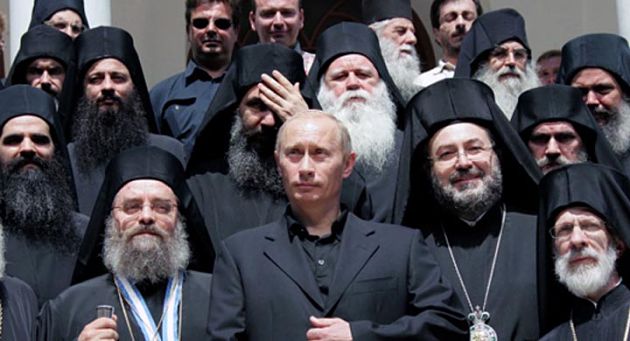The Moscow Patriarchate (ROC MP) has responded to the revolutionary decision of the Patriarchate of Constantinople, which returned it to the level of the 17th century, with an equally radical decision. For background on this whole story, see here. The Synod of the ROC, headed by Comrade Gundyaev, announced yesterday in Minsk that the Russian Orthodox Church is breaking Eucharistic communion with the Patriarchate of Constantinople, which is considered the Ecumenical Patriarchate, i.e. the highest of all Orthodox churches.
In simple terms, the Moscow priests have issued a “righteous takfir” against the Greeks, declaring that the faithful of the ROC MP are not allowed to pray in their churches and that the ritual acts (“sacraments”) they perform are no longer recognized.
First, the basic facts – what this means for the ROC MP parishioners themselves:
- It is no secret that in recent years a cult of Mount Athos has developed among the Russian political elite. Many high-ranking officials regularly traveled to the mountain, located on the Greek peninsula and known for its Orthodox mysticism, to participate in its mysteries or at least to be seen as Orthodox mystics by their colleagues (who are no different from them, having once been Communists). Even the “national leader” himself flew there, around whom a whole propaganda campaign about “Putin – the church-oriented ruler and the hope of world Orthodoxy” unfolded. Now the members of the Athonite sect will have nowhere to go, because except for one monastery, which is considered too radical and has been under siege for many years, all the other monasteries on Athos belong to the Patriarchate of Constantinople. So they will now have to engage in ecclesiastical import substitution, even though many of them have managed to buy multimillion-dollar villas near Athos to combine pleasure with usefulness. If they continue to do so, ignoring the decisions of the ROC deputies, they will create a real “fifth column” within the Russian ruling circles, with far-reaching consequences for their unity.
- Significant damage has been done to the Russian Orthodox diaspora in Western countries, where the parishes of the Patriarchate of Constantinople and the ROC MP are closely intertwined. Usually there are limited branches of the ROC MP in these countries, but officially the majority of local Orthodox belong to the metropolises under the jurisdiction of Constantinople. Therefore, many Orthodox, including local Russians, did not see a fundamental difference in which of these churches they attended, seeing them as part of a single universal Orthodox Church. Now, this unity has been dealt a blow, and in the parishes belonging to the branches of the ROC MP, people are already being warned (although this began even before yesterday’s decision) that by praying in the churches in which they have been praying for years and decades, they will become “apostates.”
- On a smaller scale, it will now be uncomfortable for Russian Orthodox tourists who used to be able to go into any Orthodox church in Istanbul, Antalya, Crete, and other places and light a candle. Now they are banned from entering most of these places, and the ban comes from their own church, which says they would become “apostates” if they did.
Andrey Kurayev, a controversial deacon who has become a pariah within the ROC in recent years, characterized the consequences of this decision for Russian Orthodox believers as follows: “…we will be degraded to the level of a church of one nation. Like the Armenian Church. In his opinion, the actions of the ROC deputy now logically lead either to a rupture in relations with other local Orthodox Churches, which of course maintain Eucharistic communion with Constantinople (even if they condemn its actions in Ukraine, like the Serbian Church), or to an undermining of Church dogmas (similar to the principle “he who does not consider a disbeliever to be a disbeliever, is himself a disbeliever”): “If anyone prays with those who have been excommunicated from the Lord’s Supper, even if it is done at home, let him be excommunicated. “If… a bishop, priest, deacon or any other member of the clergy is found to be communicating with those excommunicated from the Lord’s Supper, let him himself be excluded from the Lord’s Supper, thus causing confusion in the ecclesiastical office” (Rule 2 of the Council of Antioch).
Our Synod itself recognizes this: “To enter into Eucharistic communion with schismatics is a canonical crime and entails appropriate prohibitions”. Thus, all those who have entered communion with heretics and schismatics are subject to “purification”.
However, the most interesting thing is that becoming “new Armenians” is exactly what the ROC MP wanted to avoid by trying to prevent the Ukrainian Orthodox Church’s ecclesiastical independence and getting into a dispute with the Ecumenical Patriarchate over it. For the empire of the ROC MP as the core structure of the “Russian world” such an outcome would be (and will be!) like death – actively using Russian nationalism for their purposes, they certainly do not want to become a church of the Russian people. Because in that case they will have to lose not only Ukraine and Belarus, but also, as a next step, the Chuvash or Kryashens within Russia itself, to whom Constantinople can grant autonomy. Moreover, despite the fact that the followers of Athonite mysticism are now effectively expelled from the ROC MP, they may head there.
In general, the chimera of the so-called “Russian world” (which is neither Russian nor a world) is rapidly crumbling before our eyes. And its gravediggers are precisely those who shout the loudest in its defense.

